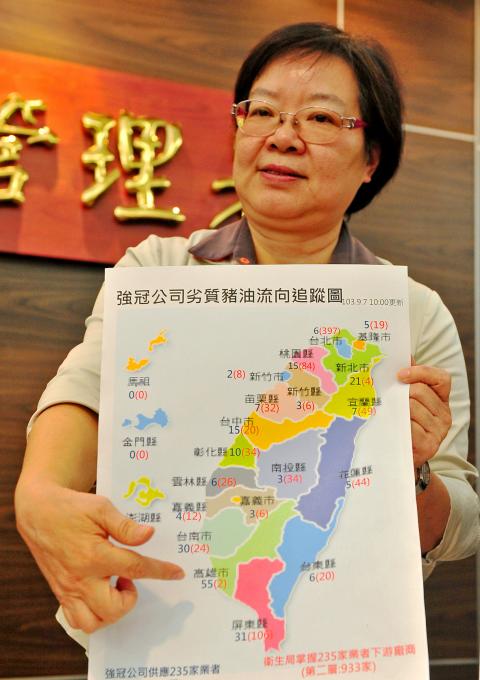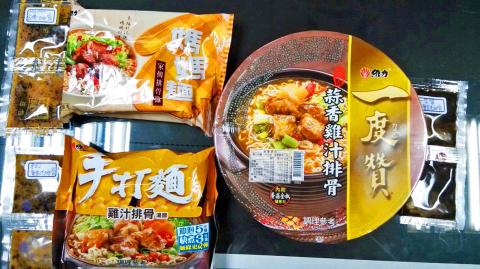More household food brands were drawn into the snowballing recycled waste oil scandal yesterday as the Food and Drug Administration (FDA) and health departments nationwide stepped up efforts to trace the downstream buyers of the companies that have allegedly made purchases from oil manufacturer Chang Guann Co (強冠企業).
New names included Taipei Leechi (台北犁記), a breakaway from a famous bakery store founded in 1894 in the what is now Shekou Borough (社口) of Greater Taichung’s Shengang District (神岡).
The green bean and meat pastry (綠豆椪) has been a popular gift during the annual Mid-Autumn Festival.

Photo: CNA
“We added Taipei Leechi to the list of implicated companies late last night after discovering that 187 of the 453 15kg cartons of tainted ‘fragrant lard oil’ purchased by the Taipei-based bakery ingredients company For Chorn Co (佛晨) from Chang Guann had been sold to it and its affiliated bakery store, Ricians Co (聯翔喜餅),” the Taipei City Government’s Department of Health said in a press release.
The department said the two pastry stores used the deficient oil in its entirety to manufacture a total of 19,800 meat-filled sesame pastries (芝麻肉餅) weighing 600g each.
Hsia Chi Wan (呷七碗), one of the nation’s most famous food manufacturers of glutinous rice gift boxes for babies’ first-month birthday, also became engulfed in the oil scandal, when its prepackaged fried rice noodles were found to contain minced pork manufactured by Miaoli-based Mei Chu Food (美廚食品) using the contaminated lard oil.

Photo: Chien Jung-fong, Taipei Times
According to the New Taipei City Government’s Public Health Department, Hsia Chi Wan was unaware that its rice noodle products had been tainted by the questionable oil, since it did not purchase the minced pork directly from Mei Chu Food, but rather from Yih Yuan Additives Chemical Industry Co (億元食品化工) in Keelung.
In addition, supermarket chain Wellcome (頂好超市) was also implicated after the company it entrusted with producing its own-branded mushroom and minced pork seasoning packs — Luxe Enterprises Ltd (陸仕企業) — was found to have used the problematic lard oil in the product.
Chang Guann has been in hot water after it was found to have purchased 247 tonnes of recycled waste oil — collected from restaurant fryers, discarded animal parts, fat and skin — from an unlicensed factory in Pingtung County since February.

Photo courtesy of the Changhua County Public Health Bureau
It had mixed the recycled oil with processed lard and turned it into 782 tonnes of edible lard oil, before selling the product to 236 oil distributors, restaurants and food processing and manufacturing companies around the nation.
As of 2pm yesterday, the FDA had found that 971 food factories, restaurants, and street vendors had purchased the edible oil or products made with it from the 236 establishments.
Of the 782 tonnes of the tainted lard, 142.1 tonnes have been sealed for investigation and 502.9 tonnes have been used in the production of a total of 136 kinds of food products, the FDA said, adding it was still tracing the remaining 137 tonnes of the oil.
FDA Deputy Director-General Chiang Yu-mei (姜郁美) yesterday announced that businesses could face fines ranging between NT$60,000 and NT$50 million (US$2,000 and US$1.6 million) if found to be selling the contaminated products or using the tainted lard after tomorrow.
Meanwhile, Wei Lih Food Industrial Co (維力食品), a well-known instant noodle manufacturer, recalled three of its noodle products after they were found to be made with recycled oil.
In a statement, Wei Lih said that it was notified a day earlier by the Changhua County Public Health Bureau that its supplier, Mei Chu Food, had used recycled oils provided by Chang Guann Co as ingredients for the three products.
In light of food safety concerns, Wei Lih said the company would accept returns and provide refunds for the named products. Wei Lih’s major retailers, including Carrefour, have also begun removing the noodles from store shelves.
According to the Changhua County Public Health Bureau, Wei Lih has sold 555,246 packages of the three named instant noodles, with another 115,524 packs in inventory having being sealed for investigation.
Additional reporting by CNA

MORE VISITORS: The Tourism Administration said that it is seeing positive prospects in its efforts to expand the tourism market in North America and Europe Taiwan has been ranked as the cheapest place in the world to travel to this year, based on a list recommended by NerdWallet. The San Francisco-based personal finance company said that Taiwan topped the list of 16 nations it chose for budget travelers because US tourists do not need visas and travelers can easily have a good meal for less than US$10. A bus ride in Taipei costs just under US$0.50, while subway rides start at US$0.60, the firm said, adding that public transportation in Taiwan is easy to navigate. The firm also called Taiwan a “food lover’s paradise,” citing inexpensive breakfast stalls

TRADE: A mandatory declaration of origin for manufactured goods bound for the US is to take effect on May 7 to block China from exploiting Taiwan’s trade channels All products manufactured in Taiwan and exported to the US must include a signed declaration of origin starting on May 7, the Bureau of Foreign Trade announced yesterday. US President Donald Trump on April 2 imposed a 32 percent tariff on imports from Taiwan, but one week later announced a 90-day pause on its implementation. However, a universal 10 percent tariff was immediately applied to most imports from around the world. On April 12, the Trump administration further exempted computers, smartphones and semiconductors from the new tariffs. In response, President William Lai’s (賴清德) administration has introduced a series of countermeasures to support affected

CROSS-STRAIT: The vast majority of Taiwanese support maintaining the ‘status quo,’ while concern is rising about Beijing’s influence operations More than eight out of 10 Taiwanese reject Beijing’s “one country, two systems” framework for cross-strait relations, according to a survey released by the Mainland Affairs Council (MAC) on Thursday. The MAC’s latest quarterly survey found that 84.4 percent of respondents opposed Beijing’s “one country, two systems” formula for handling cross-strait relations — a figure consistent with past polling. Over the past three years, opposition to the framework has remained high, ranging from a low of 83.6 percent in April 2023 to a peak of 89.6 percent in April last year. In the most recent poll, 82.5 percent also rejected China’s

PLUGGING HOLES: The amendments would bring the legislation in line with systems found in other countries such as Japan and the US, Legislator Chen Kuan-ting said Democratic Progressive Party (DPP) Legislator Chen Kuan-ting (陳冠廷) has proposed amending national security legislation amid a spate of espionage cases. Potential gaps in security vetting procedures for personnel with access to sensitive information prompted him to propose the amendments, which would introduce changes to Article 14 of the Classified National Security Information Protection Act (國家機密保護法), Chen said yesterday. The proposal, which aims to enhance interagency vetting procedures and reduce the risk of classified information leaks, would establish a comprehensive security clearance system in Taiwan, he said. The amendment would require character and loyalty checks for civil servants and intelligence personnel prior to